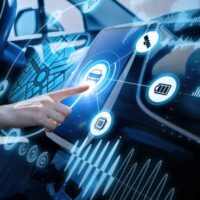Autonomous Vehicles and Liability: What Happens When a Self-Driving Car Causes a Crash in West Palm Beach?

Self-driving cars, also known as autonomous vehicles, are increasingly appearing on Florida roads, promising greater safety, convenience, and efficiency. However, as these innovative technologies become more commonplace, concerns regarding liability in the event of an accident also increase.
Determining responsibility when a self-driving vehicle is involved in a collision presents unique legal challenges. Working with experienced West Palm Beach car accident attorneys is crucial for anyone involved in an accident involving an autonomous vehicle.
Autonomous Vehicle Technology
Autonomous vehicles utilize advanced technologies, such as radar, sensors, cameras, and sophisticated software, to navigate roads without human intervention. These vehicles can operate at varying levels of autonomy, from driver assistance technologies (Level 1 and Level 2) to fully self-driving vehicles (Level 4 and Level 5).
Despite their technological sophistication, autonomous vehicles are not immune to accidents. When these crashes occur, it raises critical questions about liability, which may involve multiple parties, including vehicle manufacturers, software developers, and drivers themselves.
Liability Challenges with Self-Driving Cars
In traditional vehicle accidents, liability typically rests on the driver responsible for the crash. However, autonomous vehicles significantly complicate this framework. Because the vehicle’s decisions are driven by technology rather than human action, responsibility could potentially fall on:
- The vehicle manufacturer for design defects or production flaws.
- Software companies for faulty algorithms or inadequate updates.
- Companies operating fleets of autonomous vehicles.
- Human operators who failed to intervene despite warnings from the vehicle’s system.
Identifying exactly who or what is responsible requires a thorough investigation, typically involving extensive analysis of vehicle data, software logs, and engineering reviews.
Florida’s Legal Framework for Autonomous Vehicles
Florida is at the forefront of autonomous vehicle regulation, having passed specific laws governing their use. Florida statutes explicitly permit autonomous vehicle testing and usage on public roads, provided the vehicles meet certain safety and insurance standards. The law clearly assigns liability to the entity deploying the autonomous vehicle if negligence or vehicle malfunction causes a crash.
Despite these regulations, complex issues persist. Florida’s legal framework is continually evolving, influenced by ongoing legislative updates, technological advancements, and significant court decisions related to autonomous vehicle incidents.
Establishing Fault in Autonomous Vehicle Crashes
Determining fault in an autonomous vehicle accident often involves intricate technical analysis. Accident reconstruction experts, automotive engineers, and software specialists are typically required to determine the exact cause. Key questions explored during these analyses include:
- Was the crash caused by a software malfunction or hardware failure?
- Did the autonomous system adequately warn the driver of the need for human intervention?
- Were all safety protocols and updates properly implemented by the manufacturer or software developer?
- Was the vehicle operator reasonably attentive and responsive to any system alerts?
Comprehensive data obtained from the autonomous vehicle’s onboard systems can provide crucial evidence to resolve these questions.
Insurance Implications for Autonomous Vehicles
Insurance coverage in autonomous vehicle accidents is another complex issue. Insurance companies face challenges in assessing risk, assigning liability, and determining premiums. Insurers typically evaluate autonomous vehicle crashes based on product liability rather than traditional automobile accident coverage.
In many cases, claims involving autonomous vehicles will include extensive negotiations or litigation with the manufacturers’ or software developers’ insurance providers. Having a skilled attorney experienced in navigating these insurance complexities is essential to securing appropriate compensation.
Navigating Complex Litigation
Litigating cases involving autonomous vehicles demands specialized knowledge, extensive resources, and meticulous case preparation. Autonomous vehicle manufacturers and software developers typically have significant legal resources, often vigorously defending their technology.
Successful litigation requires attorneys to possess a thorough understanding of autonomous vehicle technology, regulatory frameworks, and relevant legal precedents. They must skillfully manage complex discovery processes, which involve significant technological evidence, expert testimony, and detailed documentation.
Contact Smith, Ball, Báez & Prather
If you’ve been involved in a crash with an autonomous vehicle in West Palm Beach, securing knowledgeable legal representation is critical. At Smith, Ball, Báez & Prather, our experienced West Palm Beach car accident attorneys have the specialized expertise needed to navigate the complexities surrounding self-driving car accidents.
We are committed to ensuring you receive the justice and compensation you deserve. Contact us today for a consultation to protect your legal rights.
Sources:
- Florida Statutes on Autonomous Vehicle Regulations
- National Highway Traffic Safety Administration (NHTSA) guidelines
- Relevant Florida Court Decisions on Autonomous Vehicle Liability
